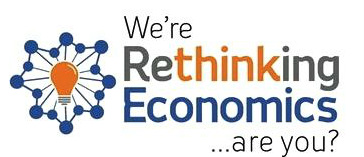Economics beyond Krugman, Mankiw, and Rodrik Economics students today are complaining more and more about the way economics is taught. The lack of fundamental diversity — not just path-dependent elaborations of the mainstream canon — and narrowing of the curriculum, dissatisfy econ students all over the world. The frustrating lack of real-world relevance has led many of them to demand the discipline to start developing a more open and pluralistic theoretical and methodological attitude. Dani Rodrik — among economics journalists and commentators often described as a heterodox economist — has little understanding of these views, finding it hard to ‘understand these complaints in the light of the patent multiplicity of models within economics.’ Rodrik
Topics:
Lars Pålsson Syll considers the following as important: Economics
This could be interesting, too:
Lars Pålsson Syll writes Schuldenbremse bye bye
Lars Pålsson Syll writes What’s wrong with economics — a primer
Lars Pålsson Syll writes Krigskeynesianismens återkomst
Lars Pålsson Syll writes Finding Eigenvalues and Eigenvectors (student stuff)
Economics beyond Krugman, Mankiw, and Rodrik
 Economics students today are complaining more and more about the way economics is taught. The lack of fundamental diversity — not just path-dependent elaborations of the mainstream canon — and narrowing of the curriculum, dissatisfy econ students all over the world. The frustrating lack of real-world relevance has led many of them to demand the discipline to start developing a more open and pluralistic theoretical and methodological attitude.
Economics students today are complaining more and more about the way economics is taught. The lack of fundamental diversity — not just path-dependent elaborations of the mainstream canon — and narrowing of the curriculum, dissatisfy econ students all over the world. The frustrating lack of real-world relevance has led many of them to demand the discipline to start developing a more open and pluralistic theoretical and methodological attitude.
Dani Rodrik — among economics journalists and commentators often described as a heterodox economist — has little understanding of these views, finding it hard to ‘understand these complaints in the light of the patent multiplicity of models within economics.’ Rodrik shares the view of his colleagues Paul Krugman and Greg Mankiw — both of whom he approvingly cites in his book Economics Rules — that there is nothing basically wrong with ‘standard theory’ and ‘economics textbooks.’ As long as policymakers and economists stick to ‘standard economic analysis’ everything is fine. Economics is just a method that makes us ‘think straight’ and ‘reach correct answers.’
Writes Rodrik in Economics Rules:
Pluralism with respect to conclusions is one thing; pluralism with respect to methods is something else … An aspiring economist has to formulate clear models … These models can incorporate a wide range of assumptions … but not all assumptions are equally acceptable. In economics, this means that the greater the departure from benchmark assumptions, the greater the burden of justifying and motivating why those departures are needed …
Some methods are better than others … For some these constraints represent a kind of methodological straitjacket that crowds out new thinking. But it is easy to exaggerate the rigidity of the rules within which the profession operates.
Young economics students that want to see a real change in economics and the way it’s taught, have to look beyond Rodrik, Mankiw, Krugman & Co. Those future economists who really want something other than the same old mainstream neoclassical catechism; those who really don’t want to be force-fed with mainstream neoclassical deductive-axiomatic analytical formalism, have to look elsewhere.
Just like Krugman, Rodrik likes to present himself as a kind of pluralist anti-establishment economics iconoclast, but when it really counts, he shows what he is — a mainstream economist fanatically defending the relevance of standard economic modelling strategies. In other words — no heterodoxy where it really would count.
Almost all the change and diversity that people like Krugman and Rodrik applauds only take place within the analytic-formalistic modelling strategy that makes up the core of mainstream economics. All the flowers that do not live up to the precepts of the mainstream methodological canon are pruned. You’re free to take your analytical formalist models and apply it to whatever you want – as long as you do it using a modelling methodology acceptable to the mainstream. If you do not follow this particular mathematical-deductive analytical formalism you’re not even considered doing economics. “If it isn’t modelled, it isn’t economics.” This isn’t pluralism. It’s a methodological reductionist straightjacket.
In Rodrik’s world “newer generations of models do not render the older generations wrong or less relevant,” but “simply expand the range of the discipline’s insights.” I don’t want to sound derisory or patronizing, but although it’s easy to say what Rodrik says, we cannot both have our cake and eat it. Analytical formalism doesn’t save us from either specifying the intended areas of application of the models or having to accept them as rival models facing the risk of being put to the test and found falsified.
The insistence on using analytical formalism and mathematical methods comes at a high cost — it often makes the analysis irrelevant from an empirical-realist point of view.
No matter how many thousands of models mainstream economists come up with, as long as they are just axiomatic variations of the same old mathematical-deductive ilk, they are not heterodox in any substantial way, and they will not take us one single inch closer to giving us relevant and usable means to further our understanding and explanation of real economies.
